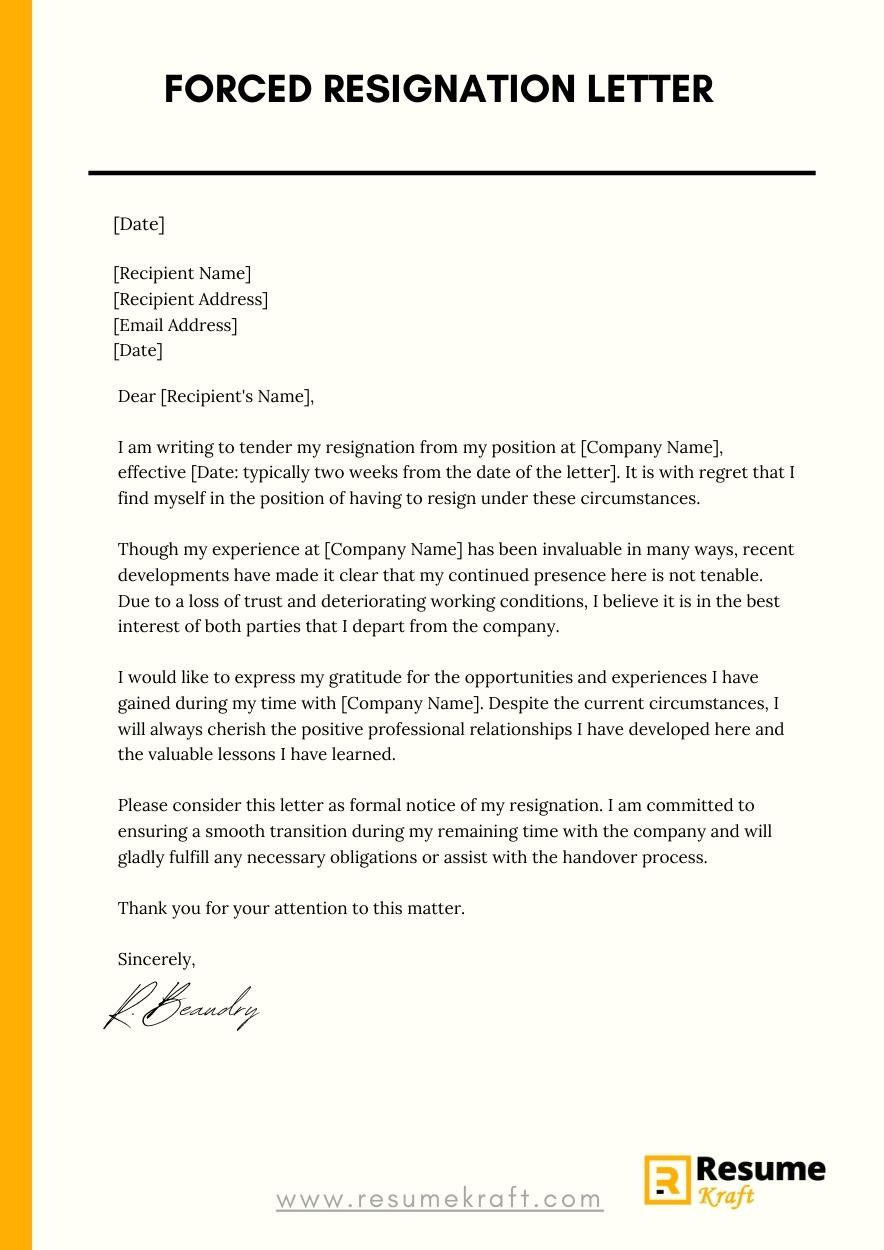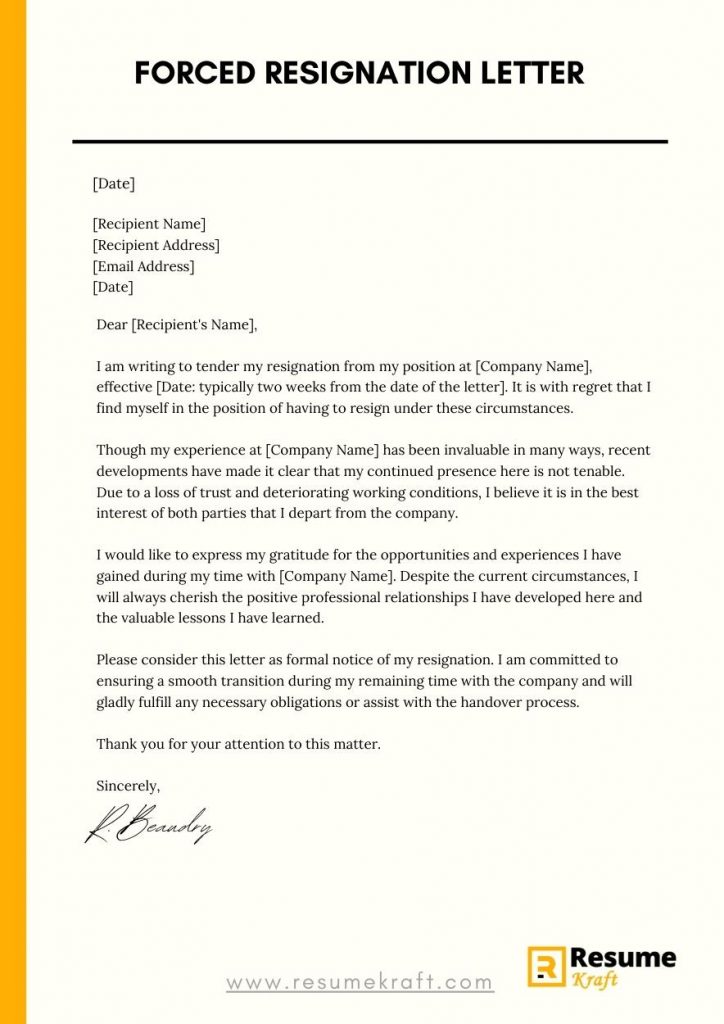
Unsure how to write a forced resignation letter that conveys professionalism and addresses your concerns? This comprehensive guide provides tips, samples, and a step-by-step process to help you navigate this challenging situation.
When faced with the difficult situation of a forced resignation, it’s crucial to handle the process with professionalism and tact. Taking the time to write a well-crafted forced resignation letter can help you convey your sentiments clearly while exhibiting maturity in dealing with the circumstances. In this guide, we’ll walk you through how to write an effective forced resignation letter, covering what to include, what to avoid, and how to format it for maximum impact.
- What to Include in a Forced Resignation Letter
- What Not to Include in Your Forced Resignation Letter
- How to Format a Forced Resignation Letter
- Forced Resignation Letter Samples
- Key Takeaways
- Frequently Asked Questions (FAQs)
- 1. Should I mention the reasons for my forced resignation in the letter?
- 2. What if I don’t have a positive experience with the company?
- 3. Can a forced resignation letter be retractable?
- 4. How can I ensure a smooth transition after submitting my forced resignation letter?
- 5. Should I notify my employer of any legal action I may take following my forced resignation?
- Conclusion
A forced resignation can be a distressing experience, but it’s essential to maintain your composure and protect your professional reputation. Writing a resignation letter ensures you have a formal record of your decision, which can come in handy for legal reasons, future job applications, or maintaining amicable relationships with your employer. It’s crucial to approach this letter carefully to express your concerns or grievances while maintaining a respectful and dignified tone.
What to Include in a Forced Resignation Letter
- Opening salutation: Address your letter to the appropriate person, typically your direct supervisor or the HR department.
- Date and subject line: Begin with the current date and a clear subject line stating your intent to resign.
- Statement of resignation: Clearly state that you are tendering your resignation and the effective date of your departure.
- Reasons for resignation (optional): Depending on the circumstances, you may include a brief explanation of the factors leading to your forced resignation.
- Express gratitude: Acknowledge any positive aspects of your time with the company and express appreciation for the opportunities.
- Closing and signature: End the letter on a courteous note, with your full name, contact information, and signature.
What Not to Include in Your Forced Resignation Letter
While it’s essential to be honest and respectful in your forced resignation letter, there are certain things to avoid:
- Negative or inflammatory language: Maintain a professional tone, avoiding aggressive or accusatory language.
- Personal attacks: Refrain from targeting individuals or criticizing specific colleagues or superiors.
- Confidential information: Do not disclose any confidential or sensitive information pertaining to the company or its employees.
- Unnecessary details: Keep your letter concise and focused on the main points, avoiding excessive explanations or irrelevant information.
- Threats or demands: Avoid making threats or demands in your resignation letter, as it can harm your professional reputation.
How to Format a Forced Resignation Letter
To ensure your forced resignation letter looks professional and organized, follow these formatting guidelines:
- Use a professional template: Choose a simple and clean template that aligns with the company’s branding, or use a standard business letter format.
- Font and size: Use a professional font (e.g., Arial, Times New Roman) and maintain a font size of 10-12 points for easy readability.
- Margins and spacing: Set one-inch margins on all sides and use single or 1.5 line spacing to provide sufficient white space.
- Alignment and indentation: Align the text to the left and apply a standard paragraph indentation (0.5 to 1 inch).
- Proofread and edit: Double-check for spelling and grammar errors, and ensure the letter flows smoothly and effectively communicates your intentions.
Forced Resignation Letter Samples
To help you get started, here are two samples of forced resignation letters:

1. Printed Resignation Letter Sample
Dear [Supervisor’s Name],
I am writing to tender my resignation from my position at [Company Name], effective [Date: typically two weeks from the date of the letter]. It is with regret that I find myself in the position of having to resign under these circumstances.
Though my experience at [Company Name] has been invaluable in many ways, recent developments have made it clear that my continued presence here is not tenable. Due to a loss of trust and deteriorating working conditions, I believe it is in the best interest of both parties that I depart from the company.
I would like to express my gratitude for the opportunities and experiences I have gained during my time with [Company Name]. Despite the current circumstances, I will always cherish the positive professional relationships I have developed here and the valuable lessons I have learned.
Please consider this letter as formal notice of my resignation. I am committed to ensuring a smooth transition during my remaining time with the company and will gladly fulfill any necessary obligations or assist with the handover process.
Thank you for your attention to this matter.
Sincerely,
[Your Full Name]
[Your Contact Information]
2. Email Resignation Letter Example
Subject: Resignation – [Your Name]
Dear [Supervisor’s Name],
I hope this email finds you well. I am writing to inform you of my resignation from my position at [Company Name], effective [Date: typically two weeks from the date of the email].
It is with deep regret that I make this decision, as I have always strived to contribute my best efforts to the team. However, recent developments have led me to conclude that my continued presence at [Company Name] is untenable, compromising both my professional growth and work satisfaction.
I would like to express my appreciation for the opportunities and learning experiences I have gained during my tenure at [Company Name]. Despite the challenging circumstances, I am grateful for the collaborative environment and the collective efforts of the team.
Please accept this email as my formal resignation notice. I am committed to ensuring a seamless transition during my remaining time here and am open to discuss any necessary handover tasks or provide guidance to ensure the continuity of work.
Thank you for your understanding. If there are any further formalities or documentation required, please let me know.
Best regards,
[Your Full Name]
[Your Contact Information]
Key Takeaways
Writing a forced resignation letter can be a challenging task, but it’s essential to approach it with professionalism and clarity. Remember these key points:
- Include the necessary elements in your forced resignation letter, such as the reason for resignation (optional) and expressions of gratitude.
- Avoid negative language, personal attacks, or divulging confidential information.
- Format your letter professionally using a proper template, font, and aligning the text correctly.
- Proofread and edit your resignation letter to ensure it is error-free and effectively conveys your intentions.
Frequently Asked Questions (FAQs)
1. Should I mention the reasons for my forced resignation in the letter?
While it’s optional, mentioning the reasons for your forced resignation can provide context and help address any misunderstandings. However, exercise caution and maintain a professional tone without resorting to blame or negativity.
2. What if I don’t have a positive experience with the company?
Even if your experience with the company has been negative, it’s vital to maintain a professional and respectful tone in your forced resignation letter. Focus on expressing your intent to resign and minimizing any potentially harmful statements.
3. Can a forced resignation letter be retractable?
In certain circumstances, a forced resignation letter may be retracted if the issues leading to the forced resignation are resolved or if both parties agree to reconcile. However, it’s essential to consult legal counsel or HR professionals for guidance specific to your situation.
4. How can I ensure a smooth transition after submitting my forced resignation letter?
To facilitate a smooth transition, communicate openly with your supervisor or HR department. Offer your assistance in training or guiding a replacement, documenting any important information, and ensuring a seamless handover process.
5. Should I notify my employer of any legal action I may take following my forced resignation?
It is generally advised to seek legal counsel before notifying your employer of any potential legal action. The forced resignation letter should focus on the resignation itself and should not contain threats or demands. Discussing legal matters is best handled through appropriate legal channels.
Conclusion
Writing a forced resignation letter can be a challenging and emotional task, but doing so with professionalism and thoughtfulness is crucial. By following the guidelines, tips, and sample letters provided in this comprehensive guide, you can navigate this difficult situation and protect your professional reputation while maintaining dignity and integrity.

